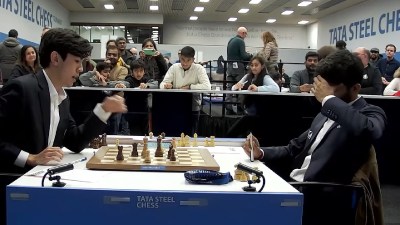Hunt begins
With its claim that Iraq was hiding chemical, biological and nuclear weapons still unproven, the Bush administration is preparing to dispatc...

With its claim that Iraq was hiding chemical, biological and nuclear weapons still unproven, the Bush administration is preparing to dispatch hundreds of additional investigators to step up the search 8212; and warning that it might take as long as a year to complete.
The Pentagon is assembling a new 8216;8216;Survey Group8217;8217; with more than 1,000 experts to interrogate Iraqi scientists and sift through recovered documents to broaden the search for weapons of mass destruction, officials said. US military units in Iraq have found no prohibited weapons since they invaded the country last month, although they have found gas masks, protective gear and antidote kits.
Some experts, both inside and outside the US government, say Iraq8217;s weapons programmes might turn out to be significantly smaller than the Bush administration has portrayed. And some warn that missteps in military units8217; initial searches of suspected weapons sites unwittingly might have destroyed useful evidence.
But administration officials say they are still certain that the regime of Saddam Hussein was developing and hiding weapons of mass destruction, and that the evidence will turn up eventually. The US contention that Saddam was holding chemical and biological weapons, and that he might give some of them to terrorists, was the administration8217;s principal rationale for going to war.
8216;8216;We are quite confident of our intelligence,8217;8217; US Secretary of State Colin Powell said in an interview last week. 8216;8216;When the search is over and evidence comes forward, this conflict will rest on a foundation of fact.8217;8217; But officials also have begun an effort to lower public expectations, emphasising how difficult it will be to find the evidence, and how long it may take for the weapons to be found.
General Tommy Franks, head of US Central Command, said recently that the weapons search could take as long as a year. Officials maintain that they are not frustrated or disappointed that evidence of their principal charge against Saddam has not yet turned up, but they acknowledge that they will face mounting scepticism from critics of the war the longer it takes.
The issue will come up this week in the UN Security Council, which has summoned Chief UN Arms Inspector Hans Blix to report on the situation. Blix clashed with the Bush administration before the war when he argued that his inspections should be allowed to continue; since the war, he has noted acerbically that the US has found no more evidence of Iraqi weapons than he did.
Blix said last week that he was ready to put a team of UN inspectors back in Iraq within two weeks. 8216;8216;I think that the world would like to have a credible report on the absence or eradication of the programme of weapons of mass destruction,8217;8217; he told the BBC.
The Bush administration says it is 8216;8216;too early8217;8217; for UN inspectors to return to Iraq, and expresses little interest in Blix8217;s services.
8216;8216;This seems to be the week of voluntarism 8230; on the part of people who say they are willing to help get rid of Iraqi weapons, weapons that they weren8217;t willing to admit were there before,8217;8217; a senior US official said. 8216;8216;There will always be people who believe we never landed on the moon,8217;8217; he said. 8216;8216;Besides, it won8217;t just be Americans. There will be Iraqi scientists talking about what they did, too.8217;8217;
A former UN inspector, who asked not to be identified, was sharply critical of the US effort so far. 8216;8216;Basically, they8217;re making some of the same mistakes we made at the start of the inspections in 1991,8217;8217; he said. 8216;8216;When the Marines blew up an Al-Samoud missile this week outside Al Kut, do you think anyone disassembled it first to see if any foreign components were in it? Or took down the serial numbers to trace parts back to suppliers? Or took precise measurements of the warhead to see what it was designed for?8217;8217;
8216;8216;They8217;re destroying things without understanding what it is and how it got there,8217;8217; he said. Officials said the Survey Group8217;s effort will rely heavily on Iraqi scientists to lead them to evidence of clandestine weapons programs. But Ewen Buchanan, spokesman for the UN inspection team, warned that the scientists might not know the answers to the most important questions. But Buchanan acknowledged that US teams 8216;8216;may get more out of interviews than we did. 8230; If there was something hidden, people under the old environment would not have told us where to look.8217;8217;
Iraqi scientists who don8217;t cooperate might be taken to a detention facility for interrogation and ultimately could be charged with war crimes, US officials said. The surrender last week of two top Iraqi scientists, Lt Gen Amer Saadi, the main liaison to UN inspection teams for chemical and biological weapons after 1995, and Jafar Jafar, who founded and led Iraq8217;s clandestine nuclear programme, raised hopes that the search would soon bear fruit. But both scientists continue to assert that 8216;8216;they destroyed everything8217;8217; in the years after the 1991 War, according to a US intelligence official familiar with the initial debriefings.
Davi Albright, a former nuclear weapons inspector in Iraq, said he long ago concluded that the administration was overstating the likelihood that Iraq had rebuilt its nuclear weapons programme. He said he is sceptical of claims that Iraq had a huge arsenal of chemical and biological weapons. 8216;8216;If there are no weapons of mass destruction, I8217;ll be mad as hell,8217;8217; Albright said. 8216;8216;I certainly accepted the administration claims on chemical and biological weapons. I figured they were telling the truth. If there is no weapons of mass destruction, I will feel taken. Because they asserted these things with such assurance.8217;8217; LATWP
- 01
- 02
- 03
- 04
- 05






























